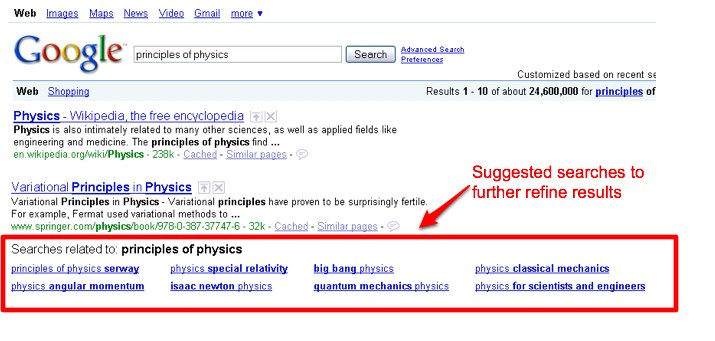Google's search upgrades: Good or evil?

Google announced two new enhancements to its core search engine, specifically what you see in the results pages following your search. The first involves longer summaries of the Web sites listed in the results pages when users type in longer queries. If you're digging deeper with your query, then Google should offer more in the summaries. That makes sense.
The second is the use of a new technology that, according to Google, "can better understand associations and concepts related to your search." The first use of this technology comes in the form of "related searches" links found at the bottom - and sometimes top - of the results page. (See image)
For the most part, Google's enhancements are effective ways of chipping away at the biggest problem with a Google search: too many results. Really, has any one ever clicked through beyond the second or third page of results? Probably not. Instead, we've learned how to refine our searches, how to add key words and phrases so Google will dig in deeper.
Now, Google is doing it for us.
I read with interest an entry on the Read Write Web blog, which argues that Google is really the one that benefits most with this change. If the snippets are longer, the chances that users will find the information they need within the summary goes up. If the information is there - on the Google page - why would anyone need to click through? At the same time, if I need to refine my search, I could just click on one of those "related searches" links, which will take me to another Google results page.
My colleague Andrew Nusca and I had a good back-and-forth chat about the Google's Good vs. Evil motives here, keeping this RWW blog post argument in-mind.
I liked what Andrew had to say about Google eliminating what he calls the "phantom traffic," the clicks that lead you to unhelpful, unrelated or otherwise dead-end sites. His argument (from our IM chat):
Andrew: when you, say, google "Dell Inspiron 700m" Andrew: looking to replace a keyboard Andrew: and check the first 10 sites to see if it has info Andrew: you really only need 1 comprehensive solution Andrew: but you can't sep. wheat from chaff from the results Andrew: if google makes it easier to do that Andrew: the less relevant sites presumably get less traffic Andrew: and the more relevant sites get (a little) more (since the user would eventually get here anyway) Andrew: so phantom traffic, in my own words, are all the clicks you make that are dead ends
He and I agree that RWW's whole "Keep people on Google pages longer" argument is a reach. Sure, that might be the end result. And sure, Google might see a bump in pageviews and time spent on its site. But, that's fine with me.
When it comes to search, people increasingly are trying to dig deeper and deeper to find what they're looking for with the least amount of effort. That's what search engines should be providing. Today, Google has given users a bigger and sharper shovel, a better tool for digging deeper.
